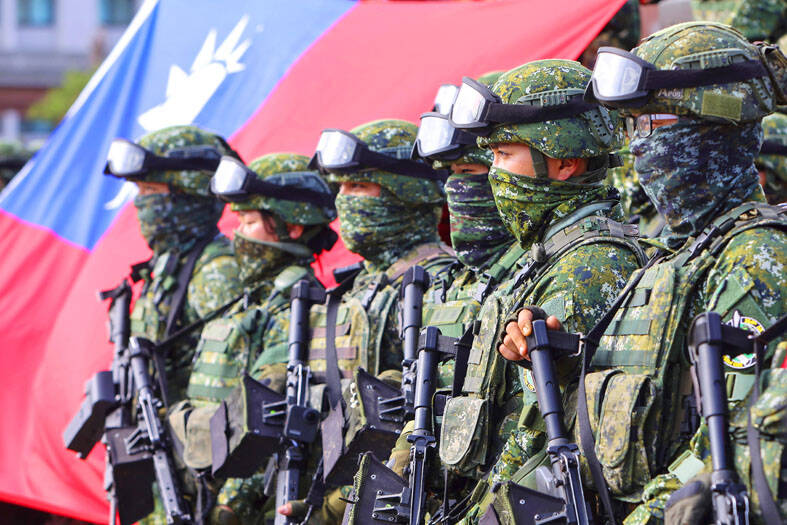The number of conscripts reporting for one-year military service is set to grow to about 53,600 by 2029, while the budget for military personnel would likely increase by NT$16 billion (US$522.41 million) by then, the Ministry of National Defense (MND) said in a written report to the Legislative Yuan.
President Tsai Ing-wen (蔡英文) on Dec. 27 announced that compulsory military service would be extended from four months to one year as part of efforts to bolster the nation’s combat readiness in the event of a Chinese attack. The change in policy affects all men born after Jan. 1, 2005, starting from Jan. 1 next year.
Minister of National Defense Chiu Kuo-cheng (邱國正) is to brief lawmakers about the details of the plan in a meeting of the Legislative Yuan’s Foreign and National Defense Committee today.

Photo: Daniel Ceng, AP
Although 78,600 conscripts would be drafted next year, only about 9,100 are expected to report for the one-year military service, as most high-school graduates tend to postpone their service until after college, the ministry said.
The remaining 69,500 conscripts would undergo four months of military training, it said.
The number of conscripts undergoing one-year military service would gradually increase to 53,600 by 2029, while the number taking part in the four-month training would gradually decrease to 9,300, the ministry said.
Conscripts would mostly supplement garrison troops, followed by main battle forces, it said.
To ensure that troops have enough leaders, the ministry said it would in 2027 begin offering an annual test to recruit college graduates to serve as professional army and non-commissioned officers.
As the monthly salary of a one-year conscript is to be raised to NT$26,307, the budget for military personnel costs is estimated to increase by NT$2 billion next year, it said.
Due to the annual increase of one-year conscripts, military personnel costs would rise by NT$16 billion by 2029.
Rifle training for conscripts is also to be adjusted.
Aside from being trained to shoot in a prone position, conscripts would be trained to shoot while standing and kneeling, as well as how to change shooting positions, it said.
They would learn to change magazines and troubleshoot their rifles, the ministry said.
The ministry’s “Intensified Shooting Training Monthly Execution Plan” showed that military units are practicing shooting once a month until December, with each conscript allowed to shoot 50 rounds.
Conscripts are allowed to shoot 60 rounds during night-time combat training, which is conducted once per season, the ministry said, adding that they are allowed to shoot 100 rounds during annual shooting training at a military base.

INVESTIGATION: The case is the latest instance of a DPP figure being implicated in an espionage network accused of allegedly leaking information to Chinese intelligence Democratic Progressive Party (DPP) member Ho Jen-chieh (何仁傑) was detained and held incommunicado yesterday on suspicion of spying for China during his tenure as assistant to then-minister of foreign affairs Joseph Wu (吳釗燮). The Taipei District Prosecutors’ Office said Ho was implicated during its investigation into alleged spying activities by former Presidential Office consultant Wu Shang-yu (吳尚雨). Prosecutors said there is reason to believe Ho breached the National Security Act (國家安全法) by leaking classified Ministry of Foreign Affairs information to Chinese intelligence. Following interrogation, prosecutors petitioned the Taipei District Court to detain Ho, citing concerns over potential collusion or tampering of evidence. The

‘FORM OF PROTEST’: The German Institute Taipei said it was ‘shocked’ to see Nazi symbolism used in connection with political aims as it condemned the incident Sung Chien-liang (宋建樑), who led efforts to recall Democratic Progressive Party (DPP) Legislator Lee Kun-cheng (李坤城), was released on bail of NT$80,000 yesterday amid an outcry over a Nazi armband he wore to questioning the night before. Sung arrived at the New Taipei City District Prosecutors’ Office for questioning in a recall petition forgery case on Tuesday night wearing a red armband bearing a swastika, carrying a copy of Adolf Hitler’s Mein Kampf and giving a Nazi salute. Sung left the building at 1:15am without the armband and apparently covering the book with a coat. This is a serious international scandal and Chinese

Seventy percent of middle and elementary schools now conduct English classes entirely in English, the Ministry of Education said, as it encourages schools nationwide to adopt this practice Minister of Education (MOE) Cheng Ying-yao (鄭英耀) is scheduled to present a report on the government’s bilingual education policy to the Legislative Yuan’s Education and Culture Committee today. The report would outline strategies aimed at expanding access to education, reducing regional disparities and improving talent cultivation. Implementation of bilingual education policies has varied across local governments, occasionally drawing public criticism. For example, some schools have required teachers of non-English subjects to pass English proficiency

TRADE: The premier pledged safeguards on ‘Made in Taiwan’ labeling, anti-dumping measures and stricter export controls to strengthen its position in trade talks Products labeled “made in Taiwan” must be genuinely made in Taiwan, Premier Cho Jung-tai (卓榮泰) said yesterday, vowing to enforce strict safeguards against “origin laundering” and initiate anti-dumping investigations to prevent China dumping its products in Taiwan. Cho made the remarks in a discussion session with representatives from industries in Kaohsiung. In response to the US government’s recent announcement of “reciprocal” tariffs on its trading partners, President William Lai (賴清德) and Cho last week began a series of consultations with industry leaders nationwide to gather feedback and address concerns. Taiwanese and US officials held a videoconference on Friday evening to discuss the